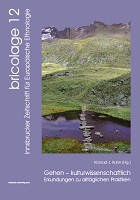Gehen – kulturwissenschaftlich
Erkundungen zu alltäglichen Praktiken
Contributor(s)
Kuhn, Konrad (editor)
Collection
AG UniversitätsverlageLanguage
GermanAbstract
According to regular reports from newspapers or television programs, advice books or fitness websites, walking is not only the most natural, but also the healthiest and most sustainable form of transport. Humans are evolutionarily born to walk, their bodies are downright conditioned to walk. At the same time, everyday human mobility raises questions of living together, of socio-economic differentiations, but above all of lifestyles and biographical influences. We are therefore dealing with culturally negotiated practices that make a physical movement process such as walking a subject that can be observed and examined in a variety of ways. What is important is therefore less the fact that everyone goes, but rather the identifiable cultural imprint of these practices and the associated levels of meaning, for example when long-distance hikes or modern pilgrimages evoke motives critical of the present and thus also social diagnostic evaluations.
Walking is therefore a major topic, but one in which precisely that empirical, cultural-scientific perspective that characterizes the European ethnology practiced at the University of Innsbruck (and elsewhere) can bring something new. From both a historical and contemporary ethnographic perspective, changes, economic cycles and negotiations that call for micro-perspective, empirical-field-related and qualitative-empathic surveys come into view. The contributions in this volume question the everyday practices of walking mobility by adopting a relational perspective in which physical walking practices are combined with experiences, ideas, projections, evaluations and adjustments. With the chosen focus on practices of walking, it is possible to understand in excerpts how powerful, social, gendered, religious, urban, scientific, textual-literary, spatial and material these practices always are.
Keywords
Cultural Studies; Ethnology; EuropeDOI
10.15203/99106-103-8ISBN
9783991061038Publisher
innsbruck university pressPublisher website
https://www.uibk.ac.at/iupPublication date and place
Innsbruck, 2023Series
bricolage, 12Classification
Cultural studies
Social and cultural anthropology


 Download
Download Web Shop
Web Shop